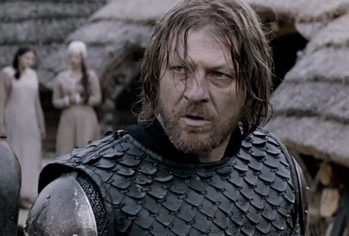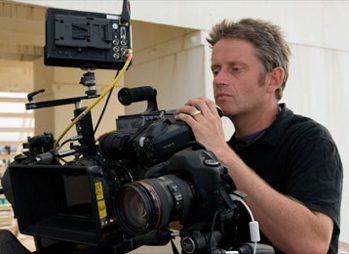 Back to selection
Back to selection
CHRISTOPHER SMITH, “BLACK DEATH”


Muscular and involving, Christopher Smith’s medieval adventure film Black Death is a satisfying throwback of sorts — a tense, character-driven period piece that is at once an action film and an act of historical reexamination, with a dash of slow burn horror and spiritual rumination to boot. Eddie Redmayne plays Osmund, a monk in a small bubonic plague-ridden hamlet in rural England. Cloistered from the decimation somewhat, he carries on a forbidden love affair with a young woman (Kimberley Nixon) from his home town. After dispatching her back to their village in order to escape the plague, Osmund is tasked with leading the prominent Knight Ulric (Sean Bean) and his band of mercenaries to investigate a small village that has been rumored to be practicing paganism and bringing the dead back to life. However once they arrive at their destination, they discover a mostly peaceful settlement led by a charismatic sorcerer (Blackbook‘s Carice Van Houten) with the healing touch, and they are forced reevaluate their mission on behalf of the church to eradicate the pagan influence.
Black Death has bounced around the fantasy/sci-fi/horror genre-fest circuit since its premiere at Film4’s FrightFest in May of last year, and it is primed to be the fourth-time helmer Smith’s most widely recognized effort since he burst onto the international festival scene with his second feature Severence in 2006. A versatile director of suspense and horror films, his other efforts include 2004’s Creep and 2008’s Triangle. Magnolia Pictures will release Black Death through its Magnet imprint this Friday.

Filmmaker: What did you learn in the process of researching medieval England and the bubonic plague for this film that has stuck with you the most?
Smith: Just the capacity for cruelty that human beings have always had. It’s especially evident in this era. Even amidst everything that was going on, people found unspeakable ways to treat each other.
Filmmaker: While watching this film I couldn’t help but think of The Wicker Man for some reason. Not the Nicholas Cage version though…
Smith: It’s certainly not one of my favorites. Maybe in the writing a bit.
Filmmaker: A few critics have noted the similarities with Aguirre.
Smith: Well one of my main references for this film visually was Aguirre, the Wrath of God.
Filmmaker: One of the members of Sean Bean’s mercenaries looks strikingly similar to Kinski.
Smith: Aguirre was, tonally as well, a big influence. I had a big childhood and teenage infatuation with The Seventh Seal. Alot of the general mood came from that film. The other references, which might be the most literal ones, are Witchfinder General and The Name of the Rose with Sean Connery, and obviously there’s a couple of gestures toward Apocalypse Now in the way this group of mercenaries find themselves sublimely in over there heads.
Filmmaker: At some point there was another director attached to this movie, correct? How did Dario Poloni’s screenplay find its way into your hands?
Smith: It was a mixture of things. There was a previous director onboard who hauled off to do another film and suddenly there was a financed movie available that the financiers would probably only greenlight if the replacement was among a list of directors they had in mind. I’ve done a certain number of films, so obviously I was somewhere on that list. They called my agent to find out if I was available and they sent me the script. I really loved it, so it was all very quick. I wish it was always like that. It’d be alot easier. [laughs]
Filmmaker: Did having another director involved previously alter how you approached the material?
Smith: Not really.
Filmmaker: Sean Bean was already involved?
Smith: Yes. He had been attached and the producers really wanted to keep him. It was one of the first things they mentioned. I love him and his work so I immediately told them, “Of course.” We were really lucky to get Eddie Redmayne as well. He just won the Tony Award and is really taking off. He was such a sport about everything.
Filmmaker: Did you change anything in Poloni’s script after taking the job?
Smith: The first half of the script is pretty much a copy of what you now see on the screen. The second half we changed considerably. I mean, literally everything that happens in the village after the party, including the cages the marsh sequences, was rewritten by Dario. He and I would just get together and brainstorm along with the producers in order to [give] the thing a balance between the realistic and the supernatural, so that a bit of the supernatural seeps into the real world. So we’d discuss the changes and come to agreement and then Dario would go off and write those sequences. It worked quite well actually.
Filmmaker: It’s rare, especially in a supernatural horror film that has quite a bit of action in it, to tell a story that treats its protagonist’s religious beliefs and sensibilities with such nuance.
Smith: Obviously I was aware when I was making the film that it deals with religion, but some religions are an easier target or a clumsier target than others. If you were going to make a film that derided religion, perhaps paganism or Christianity would be easy targets. I didn’t want to do that. It’s not about, “Whose God is better than who else’s God,” it’s about the way people’s religion gets distorted by people who are seeking power. Eddie Redmayne’s character is born at a time when the idea that he can love God and love this woman equally, which is perhaps sort of a more modern Christian idea, is just unacceptable. It had to be one way or another. He’s a monk for one thing and at the time England was essentially a fundamentalist Country. He gets taken apart for his beliefs and his ideals and it’s sort of the tragedy of the film.
Filmmaker: Was making a period piece on a constrained budget nerve-wracking?
Smith: Everything in every department of this production seemed to work in sync. The production design, make up, costume, the cinematography — they all mixed behind the presence and performances of the actors. About midway through we really got a real groove going. We would attempt things that were really difficult. We tried to shoot a big wide shot to suggest the decimation of the village at one point. When you’re trying to do that, when you’re trying to open up the scope of the film when you don’t have the budget, you have to adopt a style to be more suggestive. That’s so when you have a shot that looks deliberately over the shoulder of a character, you’re looking at less but you’re not thinking you’re looking at less because you’re cramped behind the character’s head. So the budget fit into the style and aesthetic in a way.
Filmmaker: Did you have much time to prepare with the actors?
Smith: In terms of rehearsals, we had very little time to prepare, really. I spoke to Eddie a little bit about his character because where he is emotionally at the start and where you pitch the movie emotionally is the real key. So where we pitched Eddie at the kickoff, for example, he could have been in a state of total panic, but then where does he go from there? Obviously he’s been locked away in a cell and the world around him has been decimated. When we started, I think we actually pitched Eddie slightly higher than what was right. What we then did was, we went back and reshot the scene in the cell to start Eddie lower in terms of anxiety so he had somewhere to go in the story, but we didn’t do rehearsals per se.
Filmmaker: Some of your previous ventures into the genre have had a more comedic element to them, but the tone of this film is, with some exceptions, somewhat more strident.
Smith: Well, we do have the great shadow of Monty Python and the Holy Grail hanging out back [laughs]. The guys were really aware of that, trust me. So they just played everything as real as possible. An example of where mistakes can be made, in the sequence when the mercenaries first enters the village, Tim McInnerny welcomes everybody and instead of being a monster is really nice to them. Sean Bean shakes his hand and then they all follow him into the village. One of the actors said, with all that everyone’s been through, there’s no way we would just follow him in after having all the problem they’d had. The reason we have the sequence where Sean Bean and John Lynch have an argument as they’re approaching it is because you have to let all the characters sort of follow their own stories. You don’t want to get into the whole, “my character wouldn’t do this, my character wouldn’t do that” nightmare, but because the actors were very selfless and working as a unit. Everyone seemed to be making the right decisions for the characters at the right time. There’s was none of that vanity that you sometimes get. Some actors would try to take advantage of a situations like that and certainly it wasn’t do whatever you want to do all of the time, but we didn’t have that problem.
